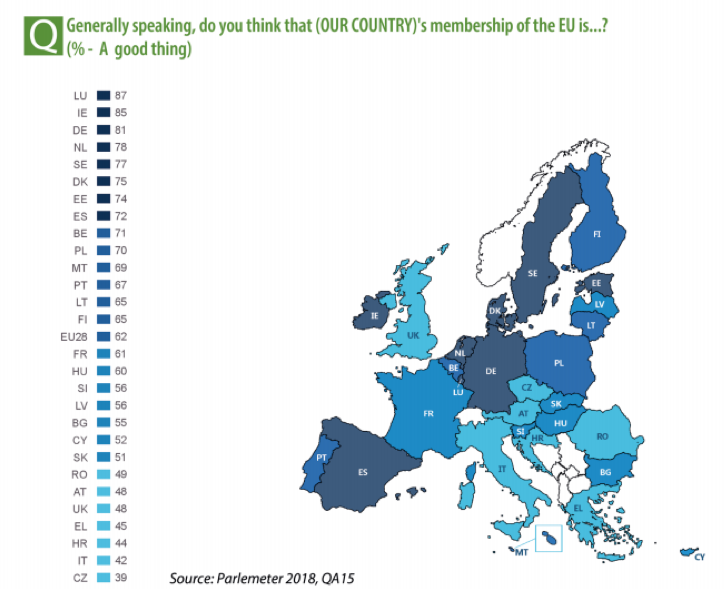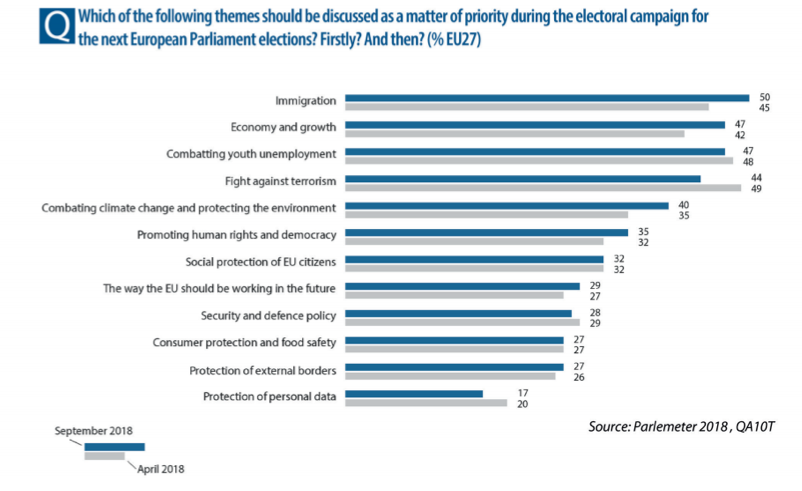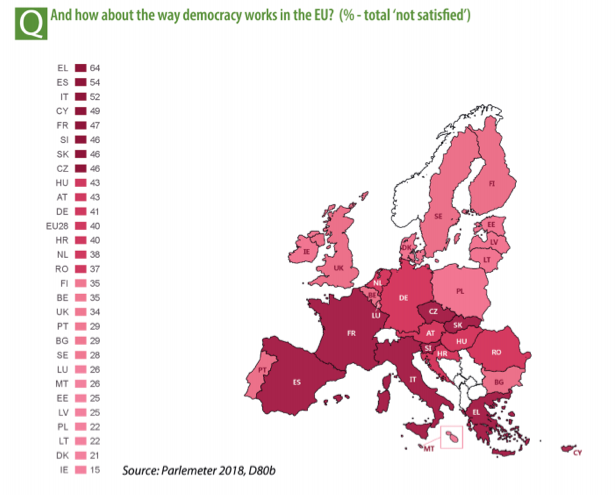A very strong attachment to the European project
Firstly, the study reveals that the attachment to the EU has never been as high as in 2018. The Parliament’s services logically insist on this result which is a victory for the European institutions. The result is surprising or even counter-intuitive given the European political context: Brexit, the rise and the arrival in power of nationalist movements in conflict with the European institutions such as Sebastian Kurz’s Austrian People’s Party (ÖVP), or Matteo Salvini’s coalition in Italy which is only united against Europe, are all events that demonstrate the rise of Euroscepticism within the Union.
Nevertheless, the figures taken from the long series (the Eurobarometer was created in 1983) confirm that 62% of respondents (EU28) believe that being a member of the EU is a good thing for their country; 68% estimate that their country has benefited from its accession, the best result since 1983. Only 17% of Europeans today announce that they would vote to leave the Union if a referendum on this subject took place.
In addition, the approval rate of the euro is 77%, which is once again historically the highest rate: Europeans globally adhere to the projects of the Union. It seems that the Europhiles can rejoice: Brexit, overall badly perceived by the European citizens, has been able to create a renewal of the European feeling. However, these results must be put into context. Parliament’s services are limited to a global analysis of the feeling of attachment to Europe, while it seems more appropriate to cut the Union by geographical area. Europhilia is not shared by all the countries of the Union. For a group of six countries (Czech Republic, Italy, Croatia, Greece, Austria and Romania) plus the United Kingdom, the satisfaction rate towards the EU is below 50%.

The feeling of attachment to the EU is not evenly distributed among the Member States: it is strong in the north and west of the EU but we observe a tendency towards Euroscepticism in the southern and eastern countries.
Hungary and Romania have also rates very little higher than 50%. Thus, Europhilia is confined to the north and the west while Euroscepticism seems stronger in the east and south: attachment to the EU is not homogeneously shared.
The case of Italy particularly illustrates the crisis of European confidence: the ‘attachment rate’ is only 42% and in the event of a referendum, 24% of voters would choose to leave the Union. In addition, 32% of voters declare they do not know if they would vote for the departure or the staying of their country, demonstrating a real disorder in the public opinion, even in a country that historically was a motor of the European construction. Finally, if Europeans globally adhere to the European project, few are optimistic about its future: only 28% think that “things are going in the right direction” in the EU; the indicator is down and close to its lowest levels.
The migration issue, foremost concern of Europeans
The study then examines the issues of concern of Europeans. The first of these is the migration issue, which is considered by 50% of respondents as “important”. The topic is certainly a fundamental factor in explaining Euroscepticism in several countries that have been directly faced with the issue. The rate, for example, is 64% in Czech Republic (+11 points), 71% in Italy (+5 points) and 64% in Greece (+5 points) against 39% in France. The next two topics are economic growth and the fight against youth unemployment (47%). Then comes the fight against terrorism (44%), higher in the countries recently affected (France and Belgium 53%), even though the overall trend is downwards.
In contrast, the sovereign and socio-economic topics reach less consensus and they are rather shared by 15 to 30% of those consulted. We must also analyse these figures in terms of dynamics: between April and September 2018, immigration gained 5 points while all the other stakes stagnated or lost points.
This phenomenon is particularly visible in the long term: in 2012, immigration was only considered an important topic by 8% of those consulted. Thus, the sovereignist, nationalist, populist and Eurosceptic formations have not finished gaining ground as they continue to focus on these stakes that gain importance in the public opinion. The fight against the euro, popular among Europeans, will surely be abandoned. On the contrary, traditional parties – especially Social Democrats – must seize these issues if they want to get out of the crisis in which they are immersed.

The emergence of the climate question
Another topic is emerging among European citizens, namely the climate issue. It touched 40% of people in September 2018 and it is in continuous progression (+5 points since April 2018). Nevertheless, it is very unequally shared between the countries of the north and the west where it can reach up to 75% in Sweden, and the countries of the south and the east where it remains a minor issue with 18% in Bulgaria or 21% in Latvia.
However, we notice that climate is a growing concern in almost all member states, such as in France where there was a rise of 14 points between April and September 2018. In France, the climate issue touches 52% of those consulted and it is considered as important as terrorism. It is just behind youth unemployment (54%). There is therefore a large and growing political space to occupy, especially for the ecologist formations. In some places, these are no longer challenged by the social democratic parties that remain in deep crisis almost throughout Europe.
Weak inclusion of the citizens in the democratic system
Finally, the barometer questions the interviewees on their relationship to the European institutions. 46% of those surveyed are satisfied with the way that democracy works in the EU. This approval rate may seem high but it is nevertheless 9 points behind the national institutions. The approval rate is again very heterogeneous depending on the country since it goes from Ireland, with 15% being “not satisfied”, to Greece where the rate is 64%.

The North-West / South-East cleavage may be relevant to explaining disparities in Europe. Only three countries have a dissatisfaction rate higher than 50% (Greece, Spain and Italy) but 12 countries reach 40%. The perception of citizens that their opinions do not count in the EU can partly explain this dissatisfaction. In that respect, 80% of questioned Danes find that their voice counts in the EU, and they are satisfied with its democratic functioning at a rate of 79%. On the contrary, Italians, Spaniards and Greeks surveyed tend to say that their voice does not count and they are not satisfied with Europe’s democratic functioning.
Nevertheless, this parameter is not enough: the citizens of several countries like France and Hungary are not very satisfied with the democratic functioning but they find that their voices count. So, the EU must increase its interactions with European citizens in order to integrate them into the European democratic process. Although 65% of questioned people announce that they will probably vote in next the European elections, in reality it is unlikely that this will be the case. Europeans still show record abstention rates (57% in the 2014 elections), and they still seem to be constantly increasing.
In their press release on the Eurobarometer, the services of the Commission and the European Parliament present in a very positive way the results of the study. They insist on Europeans’ confidence towards EU institutions and their understanding of EU policies. However, when we study the data more precisely, we realise that the Eurobarometer shows only one positive aspect – although very important: European citizens like the EU and most of them do not want their country leave it.
Nevertheless – and the services of institutions do not present it – the consulted citizens express several concerns about the future of Europe: on social and security topics in particular, and especially on the migration issue. These concerns are finally translated into a heterogeneous support of the population to the EU institutions, particularly in the east and the south.
The climate issue stands out in several countries and it could become a crucial topic for the next European elections. However, it is not shared between social classes, and concerns more the elites than the lower classes. We must therefore pay attention to the appearance of a cleavage between progressives and populists, which hides a cleavage between classes. This cleavage indeed allows indeed populists to legitimise themselves by presenting themselves as defenders of the people against the elites. It might be easy to suggest that elites and ‘the people’ do not have the same values about ecology, but in fact they simply do not have the same level of concern for this stake. The cleavage between progressives and populists is only about values, not about topics of concern.
For the pro-Europeans, the danger of a campaign that would be limited to this cleavage without answering the migratory question and “common people’s” demand for protection is very real. The pro-Europeans must therefore seize these topics, which are now monopolised by the sovereignist and Eurosceptic parties. The current progressive discourse, which defends values of openness, human rights, the climate issue and a certain economic optimism is in line with the aspirations of the upper classes, but it will meet only little echo among others.
The divisions between Europeans on the priority issues are not only found at the continental level but also in individual countries, between social classes. The EU must be careful not to be identified once again with the elites: given the current political context, it would be too much.



1. On 27 January 2019 at 22:46, by Tony Replying to: Eurobarometer: What challenges for Europe?
Replying to: Eurobarometer: What challenges for Europe?
Thank you for the poll results. It was a good read and well structured including the graphs Have a good day everyone and keep making the EU a better place for all.
Follow the comments: |
|
